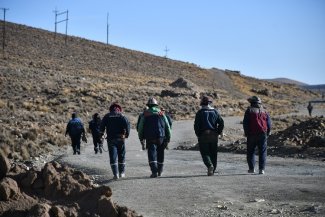Forty South African iron ore miners, who had been occupying one of the country’s biggest mines for nearly a fortnight, were arrested in a pre-dawn raid on Tuesday. The unauthorised strike began at Kumba Iron Ore’s Sishen mine in the Northern Cape on 3 October when 300 workers downed tools to demand an additional R15 000 (about US$1,714) in wages.
The workers had positioned themselves on one of the mine dumps and seized heavy-duty equipment worth R3.3 billion (US$375 million), according to a police spokesperson, including 88 hauling lorries.
Over the past weekend strikers at Africa’s biggest iron ore mine were issued an ultimatum to leave the premises, release the seized equipment and report for disciplinary hearings on Monday morning.
When they failed to comply, Kumba – an Anglo-American subsidiary – sacked all 300 workers and in the early hours of Tuesday morning, a team of 200 police, mine security and emergency services operatives took part in an operation to arrest the remaining 40 strikers.
At the time of publication, seven Kumba employees who were protesting outside a local police station against the arrests had suffered minor injuries following clashes with the police. The workers will now face six criminal charges including extortion, theft, malicious damage to property and contempt of court.
Kumba officials told reporters that the strikes had cost the company 120, 000 tonnes of iron and approximately US$14 million for each day the mine was close.
The National Union of Mineworkers (NUM) released a statement on Tuesday following the announcement of the arrests: “We’ve always urged workers to come out of the mine because we don’t condone these illegal actions,” said NUM spokesperson Lesiba Seshoka. “But dismissals will be problematic, especially as we approach the festive season.
“We want wage talks to be reopened to really address workers’ demands. Something that didn’t happen in talks last week.”
The past two months has seen South Africa gripped by wave after wave of strike action. Ever since a protest by workers at the Marikana platinum mine (run by London-based mining giant Lonmin) saw 34 strikers killed by police, an estimated 80,000 to 100,000 miners across the country have gone on strike. Although most of the strike action is unauthorised, all strikers are demanding better wages as well as improved working and living conditions.
But the strikes are also spreading to other sectors. Later this week some 200,000 municipal workers – two-thirds of the sector’s total – will be striking against official corruption and poor pay. And last Friday, thousands of truck drivers ended a two-week strike following a pay agreement.
On Wednesday, South African president Jacob Zuma called a closed-door meeting with business and labour leaders such as Cosatu general secretary Zwelinzima Vavi and finance minister Pravin Gordhan to try and find a solution to months of labour unrest.
But elsewhere in the mining sector, the strikes rumble on. Production remains at a standstill at Anglo-American’s platinum mine in Rustenberg after 12,000 workers were sacked. They were demanding a pay rise that would bring their monthly salaries to R16, 000 (approximately US$1,840).









